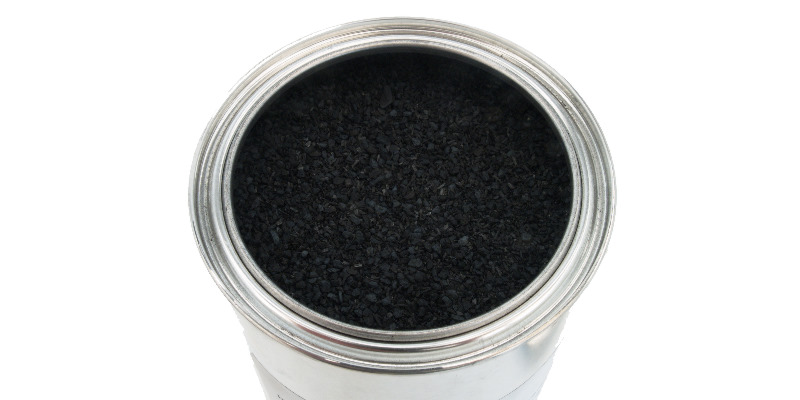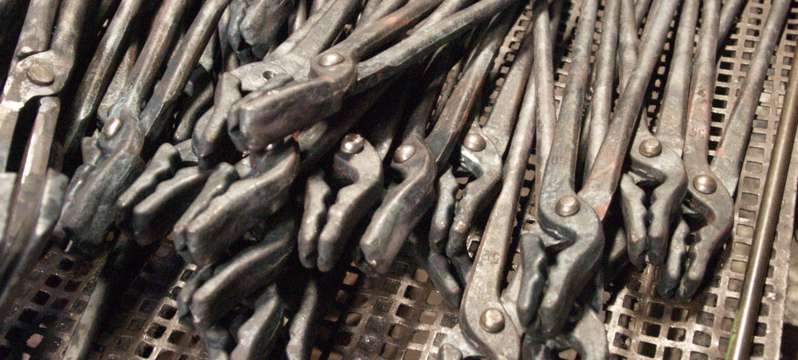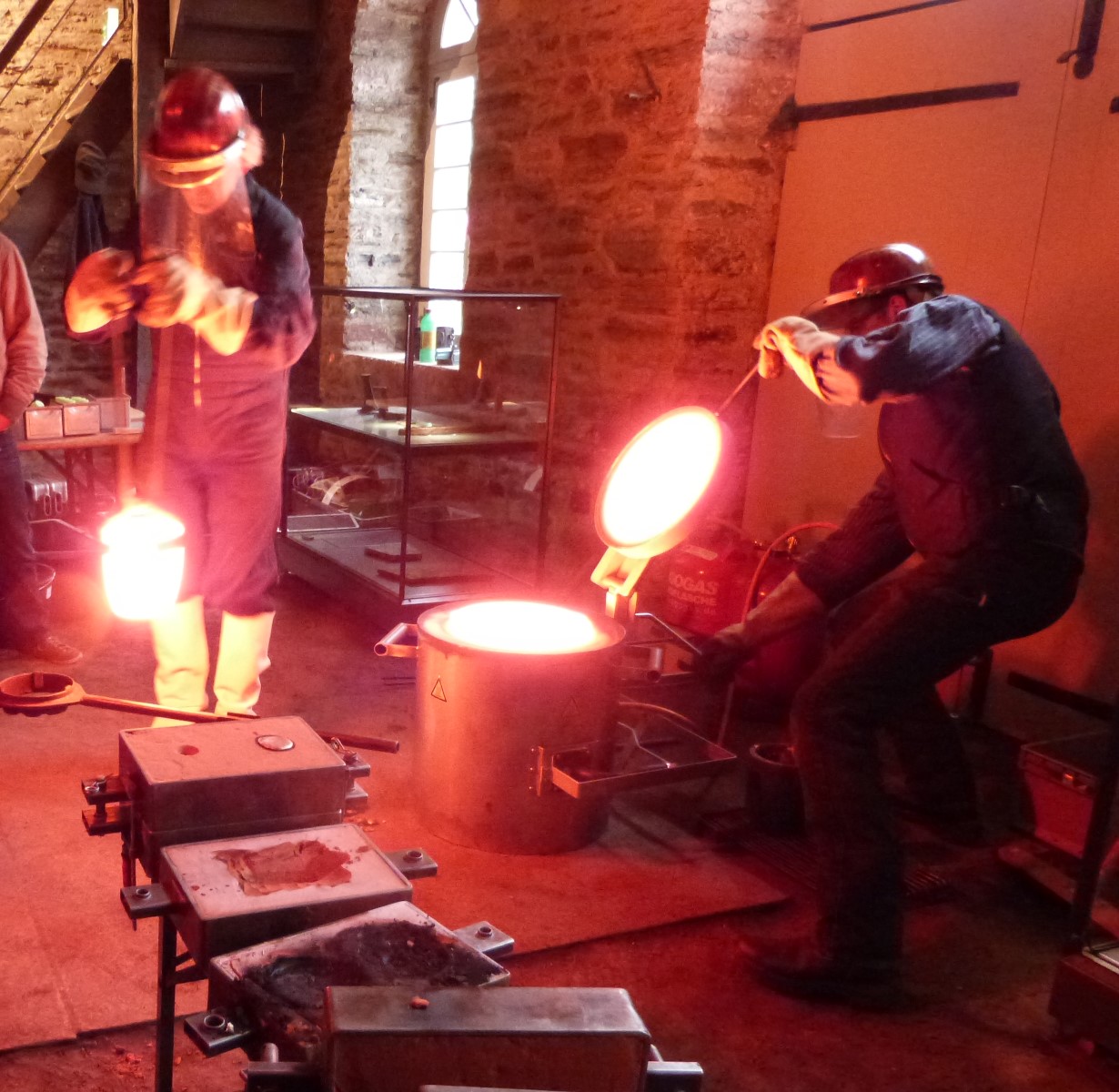
Hardening
Knives or tools must be hardened after shaping.
For reliable results, hardening oil, hardening film or hardening powder are important.
heat treating foil
From
€5.00*
00621308
The use of hardening foil ensures that air is excluded during hardening and quenching.
The hardening foil also ensures a slight delay during heating and quenching, which leads to high dimensional accuracy and less distortion of the components and leads to reproducible and safe results.
Advantages:
protects the workpiece from decarburization
protects the workpiece during quenching
ensures a safe hardening process
less distortion during hardening
extremely stable, thickness of 0.05 mm,
can be used for all temperatures from 400 °C to 1200 °C
Easy to pack
easy to use
suitable for complex workpiece geometries
Important:
This foil effectively insulates the blade from the ambient air and protects the workpiece from oxidation and decarburization. To achieve the best possible result, it is crucial to create a completely airtight seal when packing.
Tip: Some knife makers put small pieces of paper in the envelope. When the paper is burned, the remaining oxygen is neutralized, which further improves the protective effect.
Preparation:
The hardening film can be cut to size with scissors.
Please wear suitable gloves when doing this, as the film has very sharp edges.
Cut the film to the appropriate workpiece size. Cover sharp edges and corners with separate pieces of film to prevent tearing.
Since the oxygen expands in the packaging when heated, the air should be pressed out as best as possible. It also helps to wrap the workpiece in paper and to plug any holes in the workpiece with paper. The oxygen is then "used up" during the hardening process by the burning of the paper and no decarbonization occurs.
Seal the packaging tightly with a fold, possibly pressing firmly with a roller.
Place the workpiece on the charging plate in your oven. The oven should already be at hardening temperature. The film insulates so well that no thermal shock can occur. This is positive for the dimensional stability of your workpiece. For large or complicated workpieces, it is advisable to add a holding time to the hardening process. The oven should be preheated to 650°C. After a longer dwell time (adapted to the workpiece size/thickness) at 650°C, the workpiece is fully heated. You can tell that your workpiece is fully heated because the oven chamber and the workpiece are the same color.
The oven can now rise to hardening temperature, which is usually selected to be around 30°C above the specified hardening temperature. The holding time at the hardening temperature is also often selected to be 10 minutes longer.
After the hardening or annealing process has ended, you can quench the workpiece in the foil. Quenching in oil with the foil has the advantage that no oil gets onto the workpiece. This means that there is no discoloration. When quenching in air, this can be accelerated with a fan.
Further information:
The heating time may need to be extended by a few minutes to compensate for the thermal properties of the hardening foil. It may be necessary to increase the hardening temperature slightly to compensate for the insulating effect of the foil. If the workpiece is quenched together with the hardening foil, the use of a more intensive quenching medium may be necessary. This should definitely be tested on a workpiece beforehand.
Anti-scale varnish Condursal Z1100 -
€63.00*
00621350
in tin can à #Varinfo
Characteristics:
Application temperature 600°C up to 1,100°C
Glow times up to 7 hours
easy to process (brushing, rolling, dipping, spraying, etc.)
very productive, approx. 15µm layer thickness
Drying time approx. 10-30 minutes (depending on the layer thickness, temperature)
easy cleaning of the workpiece
residue-free removal after heat treatment
CONDURSAL Z1100 provides very good protection against scaling for tools and components that are austenitized or annealed in ovens at temperatures of 600 to 1,100°C.
It is suitable for steel, stainless steel, tool steels, gray cast iron, gunmetal and for annealing times up to 7 hours and more.
The paint turns black during the heat treatment and the residue from the CONDURSAL Z1100 flakes off on its own when it cools down.
At higher annealing temperatures, they can then be easily removed by brushing; sandblasting is not necessary.
Application:
The surfaces of the workpieces to be protected must be clean, dry, free of oil, rust and grease, which can be achieved by washing or degreasing with solvents.
Dedusting and removing loose components is often sufficient.
Before use, CONDURSAL Z1100 must be stirred well.
It is then applied using a soft flat brush or dipping method. Rolling or spraying is also possible.
For full effectiveness, a layer thickness of only approx. 15µm is usually sufficient.
If it is applied too thickly and, above all, unevenly, the protective layer will crack and the insulating effect will be impaired.
For long glow times, two thin applications are recommended. Drying time is usually around 10 minutes per coat.
Close the can tightly and airtight and clean tools such as brushes well.
Removal of residues:
After the heat treatment has ended, the residue from the CONDURSAL Z1100 will flake off on its own when it cools down or can be brushed off.
Hints:
If CONDURSAL Z1100 is applied too thickly, the protective layer will chip off.
The CONDURSAL Z1100 is not suitable for annealing temperatures below 600°C. At lower temperatures it behaves like a baking varnish and then forms a black coating on the workpiece surfaces that is difficult to remove.
Zunderschutzlack Thermodur Scale X 1100 |
€33.00*
00621360
Zunderschutzlack Thermodur Scale X 1100 - #Varinfo
in tin can à #Varinfo
Features:
ideal for knife blades
ensures even heating/cooling
Application temperature 600 to 1,100°C
quick processing (spray)
very economical, approx. 10-15µm layer thickness
Drying time approx. 2 minutes (at 40°C)
residue-free removal after heat treatment
Operation:
Thermodur Scale X 1100 avoids the formation of scale during the heat treatment of steel, stainless steel and tool steel.
This ensures uniform heating and cooling and reduces the risk of edge decarburization (carbon loss) on the surface of the workpiece.
Particularly ideal for knives and blades that have already been ground to size and where uniform heating is required during the hardening process.
The lacquer also ensures uniform cooling during quenching and thereby reduces hardness errors in the workpiece or blade.
Application:
1. Cleaning the workpiece (grease-free, dust-free, dry, metallically clean)
2. Shake the spray can
3. Apply evenly to the workpiece (very thin layer)
4. If the curing process is longer, apply another layer (let the previous layer dry for at least 10 minutes)
5. Allow the workpiece to dry completely before placing it in the oven (approx. 30 minutes at room temperature)
6. Heat treat the workpiece in the oven
7. Quench the workpiece - this causes the paint to “fall off”. If any residue is still visible, carefully remove it with a fine wire brush.
Notice:
It is better to apply the varnish thinly in 2 passes and let it dry thoroughly.
When spraying, work under an exhaust system, outdoors or in very well-ventilated rooms.
Metal bucket
From
€15.01*
52420099
with lid + clamping ring
ideal for our hardening oil.
Properties:
bright inside/outside
temperature resistant
with carrying handle
slightly conical shape, therefore stackable









